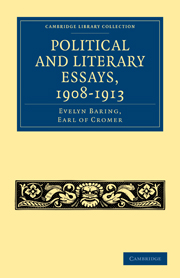Summary
“The Nineteenth Century and After,” May 1913
Mr. Bland's book, entitled Recent Events and Present Policies in China (1912), is full of instruction not only for those who are specially concerned in the affairs of China, but also for all who are interested in watching the new developments which are constantly arising from the ever-increasing contact between the East and the West.
The Eastern world is at present strewn with the débris of paper constitutions, which are, or are probably about to become, derelict. The case of Egypt is somewhat special, and would require separate treatment. But in Turkey, in Persia, and in China, the epidemic, which is of an exotic character, appears to be following its normal course.
Constitutions when first promulgated are received with wild enthusiasm. In Italy, during the most frenzied period of Garibaldian worship, my old friend, Lear the artist, asked a patriotic inn-keeper, who was in a wild state of excitement, to give him breakfast, to which the man replied: “Colazione! Che colazione! Tutto è amore e libertà!” In the Albanian village in which Miss Durham was residing when the Young Turks proclaimed their constitution, the Moslem inhabitants expressed great delight at the news, and forthwith asked when the massacre of the Giaours—without which a constitution would wholly miss its mark—was to begin. Similarly, Mr. Bland says that throughout China, although “the word ‘Republic’ meant no more to the people at large than the blessed word ‘Mesopotamia,’ men embraced each other publicly and wept for joy at the coming of Liberty, Equality, and Fraternity.”
- Type
- Chapter
- Information
- Political and Literary Essays, 1908–1913 , pp. 141 - 155Publisher: Cambridge University PressPrint publication year: 2010First published in: 1913

